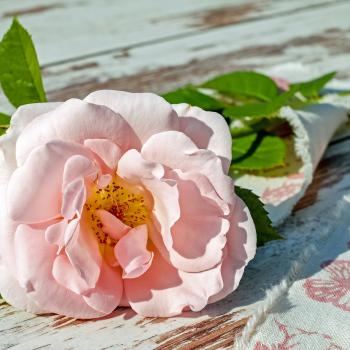So with her father’s blessing light upon her, she rode away beside the prince; and ever after, all her life was crowned with happiness as it had been written for her in the stars.
In the introduction to this short series, I offered some background on Annie Fellows Johnston’s purity morality tale, The Three Weavers. This short story had a big impact on me as a teen, and it has only been gaining in popularity in patriarchal circles in the years since then. In this post I will provide the first part of Johnston’s story, followed by some commentary.
Once upon a time (the same time that the Lady of Shalott wove her magic web, and near the four gray towers from which she watched the road running down to Camelot), there lived three weavers. Their houses stood side by side, and such had been their equal fortunes that whatever happened under the roof of one had always happened under the roofs of the others. They wove the same patterns in their looms, and they received the same number of shillings for their webs. They sang the same songs, told the same tales, ate the same kind of broth from the same kind of bowls, and dressed in the same coarse goods of hodden gray.
But they were unlike as three weavers could possibly be. The first insisted on weaving all his webs a certain length, regardless of the size of the man who must wear the mantle. (Each web was supposed to be just long enough to make one mantle.) The second carelessly wove his any length that happened to be convenient, and stretched or cut it afterward to fit whomsoever would take it. But the third, with great painstaking and care, measured first the man and then the web by the inches and ells of his carefully notched yardstick.
Now to each weaver was born a daughter, all on the same day, and they named them Hertha, Huberta, and Hildegarde. On the night after the christening, as the three men sat smoking their pipes on the same stoop, the father of Hertha said, ‘Do not think me puffed up with unseemly pride, good neighbours, but wonderful fortune hath befallen me and mine this day. Clotho, the good fairy of all the weavers, was present at my Hertha’s christening, and left beside her cradle a gift: a tiny loom that from beam to shuttle is of purest gold. And she whispered to me in passing, “Good fortune, Herthold. It is written in the stars that a royal prince shall seek to wed thy child.”‘
But Herthold’s news caused no astonishment to his neighbours. What had happened under the roof of one had happened under the roofs of all, and the same good fortune was written in the stars for each, and the same gift had been left by each child’s cradle. So the three friends rejoiced together, and boasted jestingly among themselves of the three kings’ sons who should some day sit down at their tables.
But presently Hildgardmar, the father of Hildegarde, said, ‘But there may be a slip twixt cup and lip. Mayhap our daughters cannot fulfil the required condition.’ At that they looked grave for a moment, for Clotho had added in passing, ‘One thing is necessary. She must weave upon this loom I leave a royal mantle for the prince’s wearing. It must be ample and fair to look upon, rich cloth of gold, of princely size and texture. Many will come to claim it, but if it is woven rightly the destined prince alone can wear it, and him it will fit in all faultlessness, as the falcon’s feathers fit the falcon. But if it should not be ample and fine, meet for royal wearing, the prince will not deign to don it, and the maiden’s heart shall break, as broke the shattered mirror of the Lady of Shalott.’
‘Oh, well,’ said Herthold, when the three had smoked in silence a little space. ‘I’ll guard against that. I shall hide all knowledge of the magic loom from my daughter until she be grown. Then, under mine own eye, by mine own measurements that I always use, shall she weave the goodly garment. In the meantime she shall learn all the arts which become a princess to know—broidery and fair needlework, and songs upon a lute. But of the weaving she shall know naught until she be grown. That I am determined upon. ‘Tis sorry work her childish hands would make of it, if left to throw the shuttle at a maiden’s fickle fancy.’
But Hubert shook his head. ‘Why stew about a trifle!’ he exclaimed. ‘Forsooth, on such a tiny loom no web of any kind can well be woven. ‘Tis but a toy that Clotho left the child to play with, and she shall weave her dreams and fancies on it at her own sweet will. I shall not interfere. What’s written in the stars is written, and naught that I can do will change it. Away, friend Hildgardmar, with thy forebodings!’
Hildgardmar said nothing in reply, but he thought much. He followed the example of the others, and early and late might have been heard the pounding of the three looms, for there was need to work harder than ever now, that the little maidens might have teachers for all the arts becoming a princess—broidery and fair needlework and songs upon the lute.
While the looms pounded in the dwellings the little maidens grew apace. They played together in the same garden and learned from the same skilled teachers their daily lessons, and in their fondness for each other were as three sisters.
Okay, so to recap, there were three weavers—Herthold, Hubert, and Hildgardmar—who were neighbors and friends. To each was born a daughter—Hertha, Huberta, and Hildegarde. Clotho, the good fairy of the weavers, appeared at the christening of each infant, foretold that she would marry a prince, and left each a magic loom, explaining that each girl must weave a mantle fit for a prince or she will be spurned by the prince come for her hand.
In case you haven’t already guessed, weaving mantles for their princes is meant to serve as an analogy for keeping oneself sexually pure. And not just sexually, but emotionally as well. It’s not just that the girls must not give away the mantle to anyone else, but also that she must weave it the right size for a prince—and if she starts weaving it to fit someone else, even if she doesn’t give it away, the prince will nevertheless not fit it. Further, as we shall see, each girl must guard against mistaking anyone for her prince and thus giving away the mantle she has woven too soon.
So, some quick criticism. There is no mention here whatsoever of anything the princes must do to be worthy of the girls whose hands they will seek—it all goes one way. And when you consider that this story is an analogy for sexual purity, well, the double standard becomes obvious. The princes won’t be weaving mantles for Hertha, Huberta, and Hildegarde, after all. Further, consider the utter passiveness of the girls’ role. They must sit and wait for their princes to come to them. The idea of them going out and meeting princes themselves is out of the question. And beyond just that, the girls aren’t really given any choice here. A prince (singular) will come for each of them, and they are expected to marry those princes. There is no question of whether a given girl might want a different prince, or perhaps a knight or troubadour instead.
I also think it’s worth mentioning here that no mention is ever made of the girls’ mothers. In fact, notice the first sentence of this passage: “To each weaver was born a daughter.” The mothers are entirely absent, and they continue to be absent throughout the entire story. The whole thing as about fathers and daughters. And this is no coincidence—thing of father/daughter purity balls, after all. Have you ever heard of mother/daughter purity balls? I sure haven’t! The entire setup, then, is extremely patriarchal.
Any predictions on how the story will turn out? No fair reading ahead to find out! And once you’ve made your prediction, continue on to Part III.









